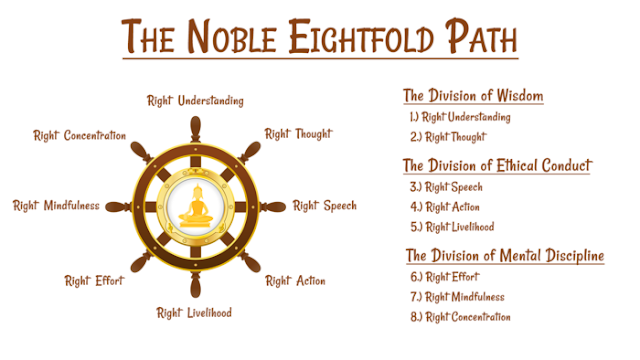This week we'll continue out study of The Nobel Eightfold Path vs. The Five Virtues of Hekate by looking deeper into Right Mindfulness.
What is Right Mindfulness and how does it relate to the Five Virtues of Hekate?
Mindfulness is currently a big deal in most self help and positive energy groups today. But what is right Mindfulness from the Buddhist perspective?
For Buddhist the four precepts of Mindfulness include:
Mindfulness of the Body - mindful of our breathing - as the breath enters the body and leaves the body. Also of how our body is position but also our internal body. Our organs and cells including the elements that make up the body. Such as water and air. This helps us understand and separate the areas that we need to be mindful of. Including death and decay of the body, adding to the understanding that this is a natural place and we will all be in this place at some point in our lives.
Mindfulness of Feelings - This is related to the sense of pleasant feelings, neutral feelings and negative feelings. Through these feelings attachment can arise. An example would be having a possession that you cherish above all other things. Possessions can cause suffering, we may not see this at first because we're happy we have this possession but the issue comes in when we lose this possession. Now we have suffering. This was explained in the Buddha's talk about releasing our cows.
Mindfulness of Mind - This is the quality of our mind. We should be aware of when our mind is angry, constricted or annoyed. Any point where our mind is closed and also when it is opened. We want to be aware of the state of our mind so that we can continue to behaving skillfully in the world. An example would be if we're in an angry state, we know that we need to avoid dealing with others until that anger has subsided. If we are mindful of the anger we can understand that we need to breathe or calm down before we move forward with the conversation. - This relates directly to our post last week regarding the Chicken Finger offerings to Hecate. I knew that in my current state and in their current state, anything I offered would be taken as an attack, so I choose to not get involved in the debate.
Mindfulness of Dhammas - In this context, it means certain types of mental states. Be aware of the hinderances. The things that hinder us in daily life. Pleasure, Ill will, Doubt are types of hinderances that will make mediation difficult. Understanding the previous precepts of mindfulness and using them to make a space for mindfulness. To be aware of these things and understanding their links to each other and to our own ability to connect without adding to the suffering of self or others.
As we look at the Five Virtues, how does Mindfulness align? To me Temperance and Wisdom aligns with them. Temperance reminds us not to take things in excess. It is moderation of self and action. We look before we leap. We evaluate before we move forward. The same can be said for Wisdom. We examine, we evaluate, we calculate and then we act. As I continue this, I believe this connection between these two allow me to maintain my devotion to Hecate as well as walk the Nobel Eightfold Path as a lay Buddhist.
What do you think? Do you connect with Right Mindfulness? How does it connect to the Five Virtues for you? Do you see a way to walk both paths? Is the middle path the right path for those devoted to Hecate?
Feel free to share your comments here on the blog, on the Facebook page or continue to share your thoughts with me privately using the message button at the bottom of the page.
Wishing you and amazing day.
Namaste,
Rev. Renee Sosanna Olson
Keybearer to the Covenant of Hekate
Found of the Sanctuary of Hecate Brimo
Resources




.png)
















